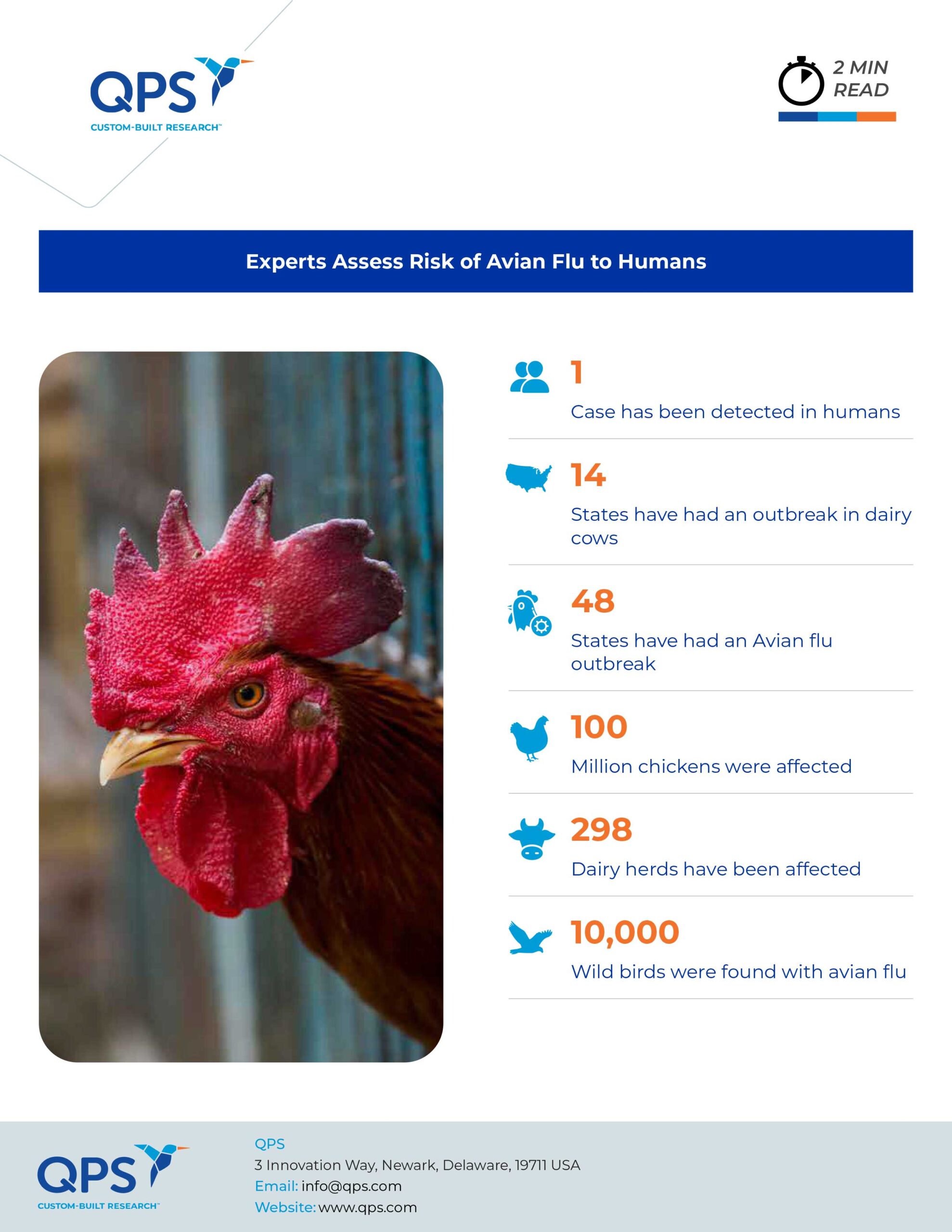United States agricultural hubs are currently facing an unprecedented outbreak of the H5N1 virus, more commonly known as the avian flu or “bird flu.” As the virus’s colloquial name suggests, avian flu originates in birds; however, H5N1 has now spread to cows at dairy farms in multiple U.S. states, as explained in an article published by the American Association of Medical Colleges (AAMC). More concerning to federal and local health agencies, the virus has also infected at least nine human farm workers. Read on for more information on the risk of avian flu to humans.
How Avian Flu Is Transmitted Among Mammals
Avian flu is generally found in birds — both wild birds and birds raised on poultry farms. However, outbreaks do occur among mammals, with previous outbreaks spreading to dozens of species, including dogs, cats, cows, and raccoons. The virus is serious; it caused more than 100 million bird deaths globally in 2022. Per the Centers for Disease Control and Prevention (CDC), the virus is often transmitted when one animal eats an infected animal; for example, if a family dog eats a wild bird that was previously infected. H5N1 can also be transmitted by bodily materials like feces and saliva. This may be the easiest transmission route between non-human mammals and humans, as suggested by the influx of infections in farm workers working closely with animals.
Should We Be Worried About Avian Flu?
As reported by the AAMC, the first known case of H5N1 transmission to a human in the U.S. occurred in 2022, resulting in a mild case and a full recovery for the infected individual. The second known U.S. case was reported in March 2024 in a dairy farm worker. Now, as of July 2024, the current avian flu outbreak has led to at least nine cases of human transmission in the United States.
The situation is relatively rare but can be very serious; the World Health Organization (WHO) reports that over the last 21 years (from 2003 to 2024), 23 countries have reported a total of just 889 human cases of H5N1. However, 463 of those cases — more than half — were fatal.
“It is a highly pathogenic strain,” said Erin Sorrell, PhD, senior scholar at the Johns Hopkins Center for Health Security and associate professor at Johns Hopkins Bloomberg School of Public Health in Maryland, in the AAMC article. “It has the ability to replicate outside the traditional locations where low-pathogenic influenza does: the intestinal tract for poultry; the upper and lower respiratory tracts in humans. The virus becomes systemic in its infection.”
In other words, H5N1 may pose risks to humans that other influenza strains do not. Fortunately, the current U.S. cases have been relatively mild.
Tracking Human Avian Flu Transmission in the US
At this time, experts are still working to track the extent of the disease — both its transmission rates to humans and its overall impact on infected individuals. The AAMC explains that tracking the full scope of transmission requires “surveillance of animal and human populations” on farms, which proves challenging across the U.S. The AAMC adds that, while scientists are encouraging increased testing to assess the situation, both workers and farm managers “are wary of government officials conducting tests.”
_____
The current avian flu outbreak is an evolving situation, with ongoing pressure on public health officials and local agencies to assess the risk to humans. As the virus continues to spread, scientists will have a better idea of its risk to humans and non-human mammals across the country. Ideally, with ongoing vigilance, the number of humans impacted by the virus will remain low.
Did you enjoy this blog post? Check out our other blog posts as well as related topics on our Webinar page.
QPS is a GLP- and GCP-compliant contract research organization (CRO) delivering the highest grade of discovery, preclinical and clinical drug research development services. Since 1995, it has grown from a tiny bioanalysis shop to a full-service CRO with 1,100+ employees in the U.S., Europe and Asia. Today, QPS offers expanded pharmaceutical contract R&D services with special expertise in pharmacology, DMPK, toxicology, bioanalysis, translational medicine and clinical development. An award-winning leader focused on bioanalytics and clinical trials, QPS is known for proven quality standards, technical expertise, a flexible approach to research, client satisfaction and turnkey laboratories and facilities. Through continual enhancements in capacities and resources, QPS stands tall in its commitment to delivering superior quality, skilled performance and trusted service to its valued customers. For more information, visit www.qps.com or email info@qps.com.








